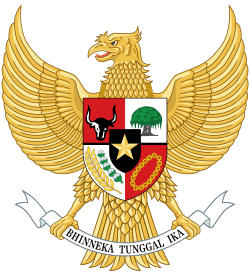Indonesians in Japan
| Total population | |
|---|---|
| 30,620 | |
| Regions with significant populations | |
| Tokyo, Nagoya, Osaka | |
| Languages | |
| Japanese, various languages of Indonesia | |
| Religion | |
| Islam · Christianity[1] · Buddhism · Hinduism |
Indonesians in Japan (在日インドネシア人 Zainichi Indoneshiajin, Indonesian: orang Indonesia di Jepang) form Japan's largest immigrant group from a Muslim-majority country. As of 2007, Japanese government figures recorded 30,620 legal residents of Indonesian nationality and estimated further 4,947 more were residing in the country illegally.[2][3]
Demography and distribution
Indonesians in Japan tend to be younger than other Muslim migrants; 64.5% of legal residents are recorded to be between 20 and 30 years old, whereas the majority of the other large Muslim migrant groups (Iranians, Bangladeshis, and Pakistanis) are between 30 and 40 years old.[4] 37% of legal residents live in the Kantō region, a much smaller proportion than for other Muslim migrants; that includes 2,175 people in Tokyo itself, 1,236 in Saitama, 1,204 in Ibaraki, 1,002 in Kanagawa, 845 in Chiba, 519 in Gunma, and 244 in Tochigi. The Greater Ōsaka Area and the Chūkyō Metropolitan Area, each have roughly 10% of Japan's Indonesian population; a further 6% can be found in both Nagano Prefecture and Shizuoka Prefecture. The remainder are scattered throughout the other prefectures, with between 30 and 500 in each one.[5]
Education
The Sekolah Republik Indonesia Tokyo (SRIT), an Indonesian international school, is in Tokyo.
Notable people
See also
References
Notes
Sources
- Okushima, Mika (2006). "日本のキリスト教会とインドネシア人-制度的背景と課題- (Churches and Indonesian Migrants in Japan: Institutional Background and Challenge)" (PDF). Intercultural Communication Studies (18): 35–111. Retrieved 2007-08-11.
- Sakurai, Keiko (July 2003). 日本のムスリム社会 (Japan's Muslim Society). Chikuma Shobō. ISBN 4-480-06120-7.
Further reading
- Asato, Wako (2006). "東アジアにおける家事労働の国際商品化とインドネシア人労働者の位置づけ (The International Commodification of Domestic Work in East Asia and the Conditions of Indonesian Transnational Domestic Workers)" (PDF). Intercultural Communication Studies (18): 1–34. Retrieved 2007-08-11.
- Hattori, Mina (2007). "在日インドネシア人ムスリム児童の宗教的価値形成-名古屋市における自助教育活動の事例から- (Development of Religious Values of Indonesian Muslim Children in Japan: A Case Study of Voluntary Educational Activities in Nagoya City)" (PDF). Intercultural Communication Studies (19): 1–28. Retrieved 2007-08-11.
- Meguro, Ushio (2005). "茨城県大洗町における日系インドネシア人の集住化と就労構造 (Establishment of the Nikkei Indonesian Community and their employment system in Oarai Town, Ibaraki)" (PDF). Intercultural Communication Studies (17): 49–78. Retrieved 2007-08-11.
- Okushima, Mika (2005). "特集にあたって-インドネシア人労働者の国際動向と日本の雇用構造における位置づけ- (Introduction to a Special Issue: International Trends of Indonesian Migrant Workers, and their Employment System in Japan)" (PDF). Intercultural Communication Studies (17): 1–48. Retrieved 2007-08-11.
- Okushima, Mika (2005). "日本漁船で働くインドネシア人-プロフィールと雇用体系の変遷 (Indonesian seafarers on Japanese fishing vessels: their profiles and changing employment system)" (PDF). Genbunken (81): 59–91. Retrieved 2007-08-11.

